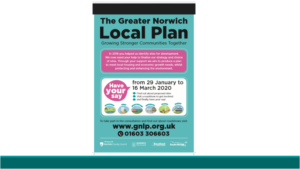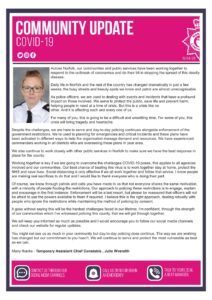|
There is a great tradition in this country of the community coming together in times of crisis, and it is wonderful to see the level of community response emerging, and this is a fantastic testament to the caring nature of our communities. However, it is important to ensure VCSE organisations are carefully monitoring their output against:
We will be focusing much of our support on helping VCSE groups and organisations on how to continue to operate effectively, efficiently, safely and considerately during the Coronavirus COVID-19 pandemic. We have provided some guidance below. If you have specific support needs please get in touch. We want to emphasise that this will be a long-term effort. And we ask you to be patient as we put our plan in place. Information and advice for peopleIt is important to only follow and distribute information from official sources. Here are links to general information from the NHS and a toolkit from Norfolk County Council. Communication
Please be aware at this difficult time that there will be much more pressure on those who are already considered to be vulnerable for example children and young people, those who have experienced domestic abuse and families under crisis. We would encourage you to think about how you can maintain contact with those you know are vulnerable, such as face timing, setting up contact plans, text messages and phone calls. Volunteers Most volunteers working with vulnerable people and children will need to be DBS checked and offered a level of training and supervision in their role. However, if this is not currently practical think about how volunteers can help without having direct contact (see safeguarding section below). Safeguarding When you are speaking to people potentially self-isolating consider advising them to:
Scams Norfolk Trading Standards have already had reports from colleagues across the country of doorstep rogues targeting people in self isolation in the hope of extorting money or gaining access to your home. If you suspect someone is not being genuine do not engage in conversation or give over any money/personal details. Please also note there have also been alerts from the World Health Organisation regarding ongoing coronavirus themed phishing attacks. If you receive any of these such emails do not reply and do not download the attachments. Any concerns should be reported to Norfolk Trading Standards by calling 0800 223 1133 Our aim is to ensure that both volunteers and those they are helping are aware of the potential pitfalls and to ensure that people make a logical and informed decision. You can view current consumer alerts for scam information on Norfolk County Council’s website here. You can also signup here to receive consumer and business scam alerts here. British Red Cross If you become aware of any of this activity you should call the police non-emergency number 101 immediately. All British Red Cross staff and volunteers have clear and recognisable ID and uniforms. You should not hand over money in advance for shopping unless you already know and trust the person. |


